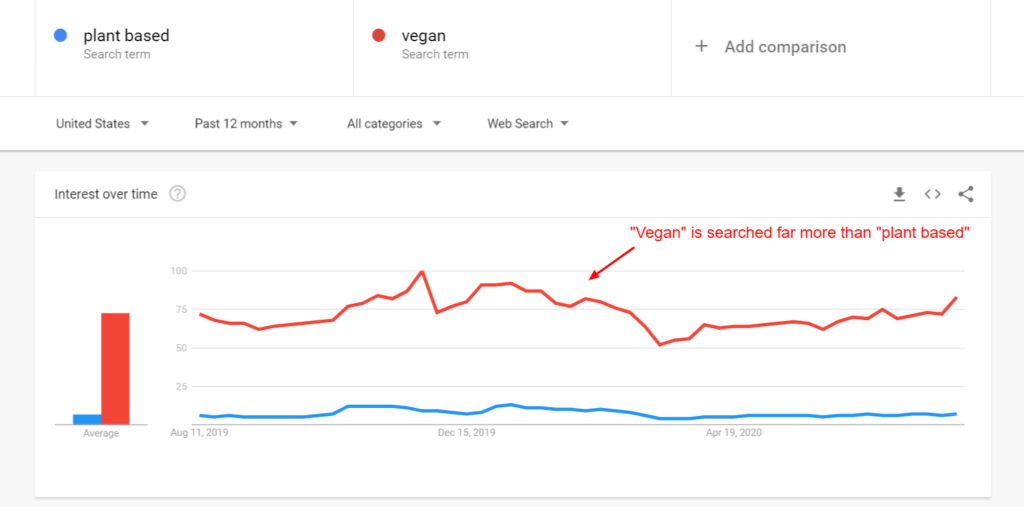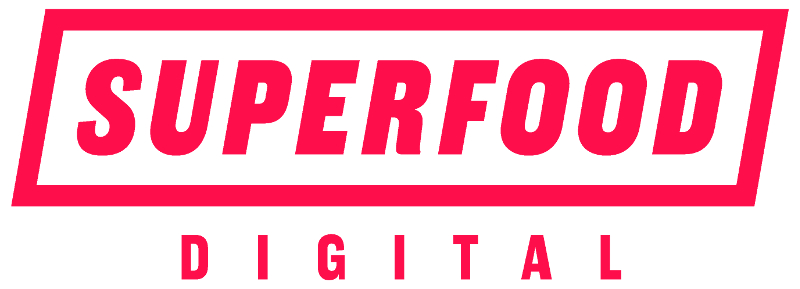If you’ve been paying attention to the latest food trends, you’ve likely seen food brands use the term “plant-based” a lot lately. Search frequency for the term has increased significantly in recent months, spiking and sustaining at the end of October 2019 with Pizza Hut, Dunkin Donuts, and Burger King launching plant-based food options, and after the September 2019 release of The Game Changers, a documentary about plant-based body builders.
Despite the term’s growing popularity, a comparison of “vegan” vs. “plant-based” on Google Trends shows that “vegan” is still a much more popular search query. So, should a food brand jump on the plant-based bandwagon, or stick with more established terminology? What’s the difference between plant-based and vegan? And what’s a better marketing strategy? Here’s what we found out.
Vegan vs. plant-based vs. whole foods: What are the differences?
Plant-based
Some of the difference between vegan and plant-based is all in who you ask. To some, being plant-based means you primarily eat food from plants. However, you may still eat some meat, or animal by-products, or wear or use products made from animals. Regardless of these specifics, there is some agreement on the terminology. At a bare minimum, someone with a plant-based diet tries to avoid meat, seafood, and by-products like dairy and eggs as much as possible.
Vegan
Vegans, on the other hand, don’t consume any meat, seafood, or animal by-products. When “vegan” was originally defined in 1944, it was associated with abstaining from these foods for ethical reasons. Now, people can call themselves vegans and avoid animal products and by-products for dietary, ethical, or environmental reasons.
Whole food
Another descriptor people can add to their diet is “whole food.” If someone describes their diet as “whole food,” they are avoiding processed foods and oils, and simple carbohydrates like white bread and rice. Technically, people who abide by vegan or plant-based diets could eat junk food, so “whole food” is an important distinction for some. Whole food eating isn’t just for plant-based or vegan eaters, either; anyone could adopt a whole food diet.

Using “plant-based” in your food marketing
“Plant-based” is a more inclusive term but searched less
Based on the definitions of “vegan,” “plant-based,” and “whole foods,” plant-based diets have the most inclusive terminology. Plant-based diets can include processed food, and some animal products and by-products. By calling your foods plant-based, you are including the widest selection of potential consumers, even if your product is technically whole food or vegan. While your product may be vegan, the term speaks to a lifestyle, and not just a diet, whereas “plant-based” is more associated with ingredients than it is with ethics.
“Vegan” is one of the least appealing food terms but searched more
According to a study conducted by Morning Consult Intelligence, out of a list of 21 food words and phrases, “vegan” was deemed the least appealing, least likely reason survey respondents would buy a product. “Fresh” and “farm-fresh” were the most appealing terms on the list. However, “whole foods” and “plant-based” were not included in the study, so it’s hard to make a direct comparison.
Alternative terms can also be perceived as negative
Because there’s no certification for being plant-based, choosing to call your product “plant-based” is purely making a branding decision. But alternatives, like saying your product is “free from” certain ingredients, can lead consumers to believe your food is also free from taste. Words that speak too much to health can also have an unappetizing effect.
What are current food brands calling their products?
Below is a list of food companies and what they call their meat-alternative burgers. From the list, you can see that it is more common for newly founded brands to use the phrase “plant-based” versus brands that have been around for longer. A few exceptions, including Lightlife and Tofurky, now call their burger plant-based, but have also used phrasing like “smart patties – meatless” and “veggie burger” in years past.
| Brand | Year Founded | Name of Burger |
| Boca | 1979 | Original Vegan Veggie Burgers |
| Lightlife | 1979 | Plant-based burger |
| Beyond | 2009 | Plant-based burger patties |
| Amy’s | 1987 | Veggie burger |
| Hilary’s | 2005 | Root veggie burger |
| Impossible Foods | 2011 | Plant-based (wholesale only) |
| Quorn | 1985 | Meatless gourmet burgers (not vegan) |
| Omnipork | 2019 | 100% plant-based |
| Tofurky | 1980 (as Turtle Island Foods), 1995 (as Tofurky products) | Plant-based burger |
| Field Roast | 1997 | Vegan hand-formed fieldburger |
| Gardein | 2003 | The ultimate beefless burger |
| Loma Linda | 1933 | Vegetarian Burger |
| Morningstar Farms | 1975 | Vegan burger |
What is the current market like for these brands?
In 2018, well-established Morningstar Farms and Gardein had the largest online market share for plant-based meat brands, with Beyond Meat creeping up to third place after doubling their online sales in 2017 and 2018. And, while Beyond Meat and Gardein market share is increasing, Boca and Morningstar Farms shares are decreasing.
Beyond Meats and impossible Foods, two of the newest plant-based players in the game, are coming in strong in the market. Since going public, Beyond Meat’s stock went from $25 to $169 at the end of August 2019, with a $10 billion market capitalization. Impossible Foods received $300 million more in investor funding in 2019. The brands have also enjoyed a lot of press by partnering with Burger King, Red Robin, KFC, Subway, Dunkin Donuts, and more.
What other terms should you use to make your brand more appealing?
You can also choose to include terms to describe your product that either require certification or don’t. Based on Morning Consult’s study, you may want to consider adding “fresh” or “nutritious” to your labels, which don’t require certifications, or “non-GMO” and “organic,” which do.
81% of respondents found products to be more appealing with “fresh,” 68% with “nutritious,” 48% with “organic,” and 46% with “non-GMO.” If your food qualifies, you can receive certifications from the USDA for organic food and from the Non-GMO project for products containing little to no GMOs.
Consider using both Vegan and Plant-Based on Your Website
It doesn’t need to be an either/or thing. For widest reach, one option is to use both vegan and plant-based terms on your website especially if SEO is a priority for your business. While we would recommend your marketing materials, branding, and packaging lead with one or the other, there is no harm in using both terms. In fact, it helps SEO since keyword diversity, essentially using synonyms, will cover more keywords and is also how people naturally write, as opposed to hammering the same term over and over again.


